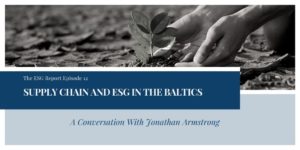
Jonathan Armstrong, Partner at Cordery Compliance, joins Tom Fox on this episode of the ESG Report to discuss important supply chain issues in the EU and Baltic regions. They talk about how legislation has evolved and the importance of looking at ESG risks with a holistic view.
Evolution of Due Diligence Legislation
“What have you seen legislative-wise around supply chain due diligence from that part of the EU?” Tom asks Jonathan. He responds that he and his team have done major work in modern slavery and supply chain due diligence in the EU and Baltics. There has been region-wide legislation, as well as country-specific legislation, he comments. Tom asks how this plays into an overall ESG framework. Jonathan remarks, “I think there’s almost three forces at play. There’s the legislative changes; there’s corporations trying to do ESG well and be regarded as good corporate citizens; and then there are potentially consumers voting with their feet as well … by not buying those products.” Consumers in the fashion and apparel industries particularly, ‘vote with their feet’ by refusing to buy from companies with bad ESG practices.
A Holistic Approach
Tom comments that a regulatory framework as well as taking a holistic approach to supply chain management would lead more companies to put processes into place to comply with the law, which would ultimately lead to more efficient supply chain procedures. Jonathan agrees. Companies who do ESG well assess supply chain risks holistically, he points out. In particular, they look at where and with whom their suppliers transact business. Although some countries are prone to higher risk, it’s not as cut and dry as labeling those countries bad and others good. He shares an example of a UK manufacturer who brought slave labor from Asia to the UK. “He just imported the problem,” Jonathan says. His UK retailers felt good about buying locally, but unknowingly was still supporting child labor.
Not Easy to Fix
“It isn’t an easy problem to fix,” Jonathan tells Tom. “But that doesn’t mean that we shouldn’t try and have in place clear expectations of our suppliers.” Due diligence and training are important in addressing these issues. Jonathan comments that confusing legislation – the voluntary Modern Slavery Register in the UK is a prime example – is adding to the problem instead of resolving it. Companies have differing opinions about their responsibility to report, and some even have instigated litigation to oppose reporting. Overall, he says, “There is a real need for transparency, and there’s also a need for corporations to invest more in doing the right thing and evidence that doing, rather than just saying they are doing the right thing.”
Resources
Jonathan Armstrong on LinkedIn | Twitter
Cordery Compliance
Articles on modern slavery and supply chain management





